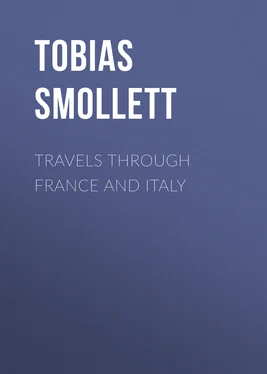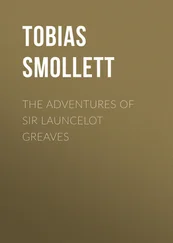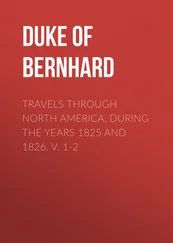Tobias Smollett - Travels through France and Italy
Здесь есть возможность читать онлайн «Tobias Smollett - Travels through France and Italy» — ознакомительный отрывок электронной книги совершенно бесплатно, а после прочтения отрывка купить полную версию. В некоторых случаях можно слушать аудио, скачать через торрент в формате fb2 и присутствует краткое содержание. Жанр: Путешествия и география, История, foreign_edu, foreign_antique, foreign_prose, на английском языке. Описание произведения, (предисловие) а так же отзывы посетителей доступны на портале библиотеки ЛибКат.
- Название:Travels through France and Italy
- Автор:
- Жанр:
- Год:неизвестен
- ISBN:нет данных
- Рейтинг книги:5 / 5. Голосов: 1
-
Избранное:Добавить в избранное
- Отзывы:
-
Ваша оценка:
- 100
- 1
- 2
- 3
- 4
- 5
Travels through France and Italy: краткое содержание, описание и аннотация
Предлагаем к чтению аннотацию, описание, краткое содержание или предисловие (зависит от того, что написал сам автор книги «Travels through France and Italy»). Если вы не нашли необходимую информацию о книге — напишите в комментариях, мы постараемся отыскать её.
Travels through France and Italy — читать онлайн ознакомительный отрывок
Ниже представлен текст книги, разбитый по страницам. Система сохранения места последней прочитанной страницы, позволяет с удобством читать онлайн бесплатно книгу «Travels through France and Italy», без необходимости каждый раз заново искать на чём Вы остановились. Поставьте закладку, и сможете в любой момент перейти на страницу, на которой закончили чтение.
Интервал:
Закладка:
"Forty or fifty years ago, before the great transformation took place on the French Riviera, when Nizza, Villafranca, and Mentone were antique Italian towns, and when it was one of the eccentricities of Lord Brougham, to like Cannes, all that sea-board was a delightful land. Only a hundred years ago Arthur Young had trouble to get an old woman and a donkey to carry his portmanteau from Cannes to Antibes. I can myself remember Cannes in 1853, a small fishing village with a quiet beach, and Mentone, a walled town with mediaeval gates and a castle, a few humble villas and the old Posta to give supper to any passing traveller. It was one of the loveliest bits of Italy, and the road from Nizza to Genoa was one long procession for four days of glorious scenery, historic remnants, Italian colour, and picturesque ports. From the Esterelles to San Remo this has all been ruined by the horde of northern barbarians who have made a sort of Trouville, Brighton, or Biarritz, with American hotels and Parisian boulevards on every headland and bay. First came the half underground railway, a long tunnel with lucid intervals, which destroyed the road by blocking up its finest views and making it practically useless. Then miles of unsightly caravanserais high walls, pompous villas, and Parisian grandes rues crushed out every trace of Italy, of history, and pictorial charm." So writes Mr. Frederic Harrison of this delectable coast, [In the Daily Chronicle, 15th March 1898.] as it was, at a period within his own recollection—a period at which it is hardly fanciful to suppose men living who might just have remembered Smollett, as he was in his last days, when he returned to die on the Riviera di Levante in the autumn of 1771. Travel had then still some of the elements of romance. Rapidity has changed all that. The trouble is that although we can transport our bodies so much more rapidly than Smollett could, our understanding travels at the same old pace as before. And in the meantime railway and tourist agencies have made of modern travel a kind of mental postcard album, with grand hotels on one side, hotel menus on the other, and a faint aroma of continental trains haunting, between the leaves as it were. Our real knowledge is still limited to the country we have walked over, and we must not approach the country we would appreciate faster than a man may drive a horse or propel a bicycle; or we shall lose the all-important sense of artistic approach. Even to cross the channel by time-table is fatal to that romantic spirit (indispensable to the true magic of travel) which a slow adjustment of the mind to a new social atmosphere and a new historical environment alone can induce. Ruskin, the last exponent of the Grand Tour, said truly that the benefit of travel varies inversely in proportion to its speed. The cheap rapidity which has made our villes de plaisir and cotes d'azur what they are, has made unwieldy boroughs of suburban villages, and what the rail has done for a radius of a dozen miles, the motor is rapidly doing for one of a score. So are we sped! But we are to discuss not the psychology of travel, but the immediate causes and circumstances of Smollett's arrival upon the territory of Nice.
VI
Smollett did not interpret the ground-plan of the history of Nice particularly well. Its colonisation from Massilia, its long connection with Provence, its occupation by Saracens, its stormy connection with the house of Anjou, and its close fidelity to the house of Savoy made no appeal to his admiration. The most important event in its recent history, no doubt, was the capture of the city by the French under Catinat in 1706 (Louis XIV. being especially exasperated against what he regarded as the treachery of Victor Amadeus), and the razing to the ground of its famous citadel. The city henceforth lost a good deal of its civic dignity, and its morale was conspicuously impaired. In the war of the Austrian succession an English fleet under Admiral Matthews was told off to defend the territory of the Nicois against the attentions of Toulon. This was the first close contact experienced between England and Nice, but the impressions formed were mutually favourable. The inhabitants were enthusiastic about the unaccustomed English plan of paying in full for all supplies demanded. The British officers were no less delighted with the climate of Nice, the fame of which they carried to their northern homes. It was both directly and indirectly through one of these officers that the claims of Nice as a sanatorium came to be put so plainly before Smollett. [Losing its prestige as a ville forte, Nice was henceforth rapidly to gain the new character of a ville de plaisir. In 1763, says one of the city's historians, Smollett, the famous historian and novelist, visited Nice. "Arriving here shattered in health and depressed in spirits, under the genial influence of the climate he soon found himself a new man. His notes on the country, its gardens, its orange groves, its climate without a winter, are pleasant and just and would seem to have been written yesterday instead of more than a hundred years ago. . . . His memory is preserved in the street nomenclature of the place; one of the thoroughfares still bears the appellation of Rue Smollett." (James Nash, The Guide to Nice, 1884, p. 110.)]
Among other celebrated residents at Nice during the period of Smollett's visit were Edward Augustus, Duke of York, the brother of George III., who died at Monaco a few years later, and Andre Massena, a native of the city, then a lad of six.
Before he left Montpellier Smollett indulged in two more seemingly irresistible tirades against French folly: one against their persistent hero-worship of such a stuffed doll as Louis le Grand, and the second in ridicule of the immemorial French panacea, a bouillon. Now he gets to Nice he feels a return of the craving to take a hand's turn at depreciatory satire upon the nation of which a contemporary hand was just tracing the deservedly better-known delineation, commencing
Gay sprightly land of mirth and social ease,
Pleas'd with thyself, whom all the world can please. . . .
Such inveteracy (like Dr. Johnson's against Swift) was not unnaturally suspected by friends in England of having some personal motive. In his fifteenth letter home, therefore, Smollett is assiduous in disclaiming anything of the kind. He begins by attempting an amende honorable, but before he has got well away from his exordium he insensibly and most characteristically diverges into the more congenial path of censure, and expands indeed into one of his most eloquent passages—a disquisition upon the French punctilio (conceived upon lines somewhat similar to Mercutio's address to Benvolio), to which is appended a satire on the duello as practised in France, which glows and burns with a radiation of good sense, racy of Smollett at his best.
To eighteenth century lovers the discussion on duelling will recall similar talks between Boswell and Johnson, or that between the lieutenant and Tom in the Seventh Book of Tom Jones, but, more particularly, the sermon delivered by Johnson on this subject a propos of General Oglethorpe's story of how he avoided a duel with Prince Eugene in 1716. "We were sitting in company at table, whence the Prince took up a glass of wine and by a fillip made some of it fly in Oglethorpe's face. Here was a nice dilemma. To have challenged him instantly might have fixed a quarrelsome character upon the young soldier: to have taken no notice of it might have been counted as cowardice. Oglethorpe, therefore, keeping his eye on the Prince, and smiling all the time, as if he took what His Highness had done in jest, said, "Mon Prince" (I forget the French words he used), "that's a good joke; but we do it much better in England," and threw a whole glass of wine in the Prince's face. An old general who sat by said, "Il a bien fait, mon Prince, vous l'avez commence," and thus all ended in good humour."
Читать дальшеИнтервал:
Закладка:
Похожие книги на «Travels through France and Italy»
Представляем Вашему вниманию похожие книги на «Travels through France and Italy» списком для выбора. Мы отобрали схожую по названию и смыслу литературу в надежде предоставить читателям больше вариантов отыскать новые, интересные, ещё непрочитанные произведения.
Обсуждение, отзывы о книге «Travels through France and Italy» и просто собственные мнения читателей. Оставьте ваши комментарии, напишите, что Вы думаете о произведении, его смысле или главных героях. Укажите что конкретно понравилось, а что нет, и почему Вы так считаете.












